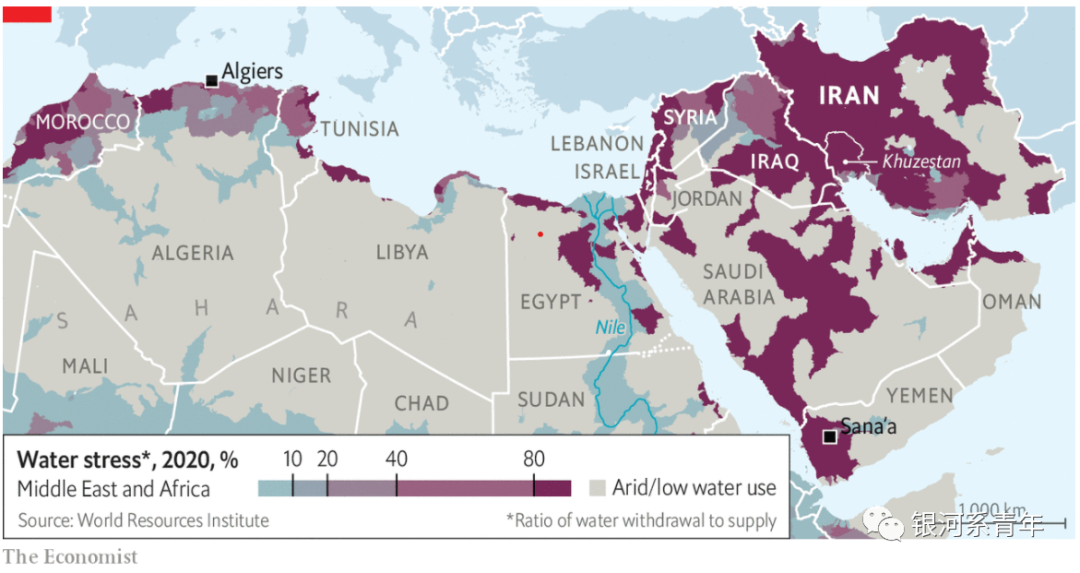
To be or not to be,that's a question.
中东和北非正面临干旱带来的政治动荡

(选自The economist 2021年7月23日版)
Dry and disorderly
干旱和骚乱
The countries of the Middle East and north Africa are parched.Governments are making things worse.
中东和北非的国家都很干旱。政府正在让事情变得更糟。
In the neighbourhood of Algiers where the presidential palace and foreign embassies are located, some think the water pressure has increased of late. But don’t tell those living in the suburbs of Algeria’s capital, where the taps have been dry for days, as temperatures and tempers rise. Protesters have blocked main roads and railways. “If the water stops flowing, so will everything else,” says a local journalist, conveying the protesters’ mindset.
在总统府和外使馆所在的阿尔及尔附近,有人认为最用水压力增加了。但不要谈论那些生活在阿尔及利亚首都周边的人,那里的水龙头已经干了好几天,同时 气温和脾气都在上升。抗议者已经堵住了主要道路和铁路。一位当地记者说:"如果水停止流动,其他东西也要停止流动。"这句话传达了抗议者的心态。
Algeria is not alone. In the past few months protests over water shortages have erupted in Iran, Iraq, Sudan and Yemen. Two protesters were shot dead in Iran on July 16th. And a lack of water is contributing to unrest elsewhere in the Middle East and north Africa.
阿尔及利亚并非唯一。在过去的几个月,伊朗、伊拉克、苏丹和也门都爆发了对水资源短缺的抗议活动。7月16日,两名抗议者在伊朗被枪杀。而且,缺水正在导致中东和北非其他地方的骚乱。
Drought has been a feature of the region since biblical times. But now climate change is causing longer dry seasons, as well as hotter heatwaves and record-setting temperature spikes. Rainfall is expected to decline, precipitously in some places, leaving farmers to dig more wells, draining aquifers and causing potentially irreversible environmental damage. For most of the region the trend is towards a drier, hotter, more miserable future.
自圣经时代以来,干旱一直是该地区的一个特征。但是现在,气候变化正在导致更长的旱季,以及更热的热浪和破纪录的最高温。降雨量预计会下降,在一些地方会特别严重,农民不得不挖更多的井,抽干含水层,造成潜在的不可逆转的环境破坏。大部分地区都是这样,趋势是朝向一个更干、更热、更悲惨的未来。
Some governments are dealing with the problem. Israel and the Gulf states rely on desalination plants, which can run on solar power and produce a cubic metre of freshwater (enough for 3,000 small water bottles) for as little as 50 cents. But many governments are making things worse. Protesters blame mismanagement and corruption for much of the misery. “The water sector is disintegrating,” says Hassan al-Janabi, a former water minister in Iraq. “There will be an explosion.”

一些政府正在处理这个问题。以色列和海湾国家依靠海水淡化厂,这些工厂可以利用太阳能运行,只需50美分就能生产一立方米的淡水(足够3000个小水瓶使用)。但许多政府正在把事情搞得更糟。抗议者将大部分苦难归咎于管理不善和腐败。"水务部门正在瓦解,"伊拉克前水务部长哈桑-贾纳比(Hassan al-Janabi)说。"将会有一场爆发。"
Agriculture accounts for the overwhelming share of freshwater taken from ground or surface water sources globally (about 70%), says the World Bank. The proportion is even higher in the Middle East and north Africa (about 80%). Crops depend entirely on irrigation in the arid region and officials say that supporting agriculture stems rural migration and reduces the need to use hard currency for food imports. So Egypt, for example, allows its farmers to take water from the Nile for nothing but the cost of pumping it.
世界银行说,在全球范围内,农业占了从地下或地表水源中获取的淡水的绝大部分份额(约70%)。在中东和北非,这一比例甚至更高(约80%)。在干旱地区,农作物完全依赖灌溉,官员们说,支持农业可以阻止农村人口迁移,减少使用硬通货进口粮食的需要。因此,例如,埃及允许自己农民从尼罗河取水, 除了收点抽水成本费外,不收取任何费用。
Such subsidies have long encouraged farmers in the region to waste water on a massive scale. Still, leaders like to use cheap water as a way to buy support or further their own interests. The regime in Jordan, one of the world’s driest countries, uses it to mollify farmers from powerful tribes in the Jordan valley. In Iran the Islamic Revolutionary Guard Corps rerouted a river to cool its steel mills in Isfahan. A former president, Akbar Hashemi Rafsanjani, is even said to have built a dam to water his pistachio crop.
这种(变相)补贴长期以来促使该地区的农民大规模地浪费水资源。不过,政治家们还是喜欢用廉价的水作为 一种 收买方式以支持或促进自身利益。约旦是世界上最干旱的国家之一,其政权利用它来安抚约旦河谷强大部落的农民。在伊朗,伊斯兰革命卫队将一条河改道用于冷却其在伊斯法罕的钢铁厂。据说前总统阿克巴-哈希米-拉夫桑贾尼甚至建造了一个水坝来浇灌他的开心果。
The protests in Iran have occurred in Khuzestan, home to most of the country’s Arabs. Much of Iran’s fresh water used to flow through the province. Old-timers remember when ships bound for America sailed up the Karun river. But dozens of dams have dried up Khuzestan’s rivers and marshes. Angry residents accuse the clerical regime of diverting water to Persian cities and seeking to drive Arabs off the land in order to drill for more oil. “No to forced migration,” chant protesters.
伊朗的抗议活动发生在胡齐斯坦省,该省是该国大多数阿拉伯人的家园。伊朗的大部分淡水曾经流经该省。老人们还记得曾经开往美国的船只沿着卡伦河 溯河而上 。但是,几十座水坝使胡齐斯坦省的河流和沼泽地干涸。愤怒的居民指责神职人员将水引向波斯城市,试图将阿拉伯人赶出土地,以便钻探更多的石油。"反对强迫移民",抗议者高呼。
Those in Algeria often blame corruption for their water woes. The government has spent more than $50bn on water projects over the past two decades, but much of it has evaporated. One former minister of water resources has been sentenced to jail for pilfering funds and in recent weeks two more have been arrested. Ten of the 11 desalination plants built by a state subsidiary are in disrepair. The story is much the same in Iraq, where the construction of a large desalination plant has been delayed for years as the country’s ruling factions bicker over who gets the contract.
阿尔及利亚的人经常将他们的用水困难归咎于腐败。在过去20年里,政府在水利工程上花费了500多亿美元,但其中大部分已无形消失。一位前水资源部长因盗用资金而被判刑入狱,最近几周又有两人被逮捕。由一家国有子公司建造的11个海水淡化厂中,有10个已经荒废。伊拉克的情况也差不多,由于该国的统治派系为谁得到合同而争吵不休,一个大型海水淡化厂的建造已被推迟多年。
War has made it hard for some countries to maintain water infrastructure. And water is sometimes used as a weapon. The jihadists of Islamic State tried to dam the Euphrates in order to starve their opponents in Iraq. Turkish-backed rebels in northern Syria have stopped operating a water plant that supplies the bread basket of their rivals, the Kurds. A report by the University of Sana’a estimated that 70% of the rural skirmishes in Yemen, before the civil war, began as disputes over water.
战争使一些国家难以维持水的基础设施。而水有时被用作武器。伊斯兰国的圣战分子试图在幼发拉底河上筑坝,以使他们在伊拉克的对手饿死。叙利亚北部由土耳其支持的叛军已经停掉一个水厂的运营,该水厂为他们的对手--库尔德人的面包篮子供水。萨那大学的一份报告估计,在内战之前,也门70%的农村小规模冲突开始于对水的争端。
Water could even become the main cause of future conflicts. Egypt and Sudan are feuding with Ethiopia over its filling of a giant dam on the Nile. “All options are open,” says Egypt’s president, Abdel-Fattah al-Sisi, menacingly. Turkey and Iran are also building dams that will deplete the water flowing to Arab countries. Israel’s blockade of Gaza ensures that the territory does not have the means to produce enough potable water.
水甚至可能成为未来冲突的主要原因。埃及和苏丹正在与埃塞俄比亚就其在尼罗河上填筑一个巨大的水坝而争执不休。埃及总统阿卜杜勒-法塔赫-塞西气势汹汹地说:“所有选择都该是面向大众的”。土耳其和伊朗也在建造水坝,这将耗尽流向阿拉伯国家的水。以色列对加沙的封锁使得该地区没法生产足够的饮用水。
Other observers, though, are more sanguine. It’s cheaper to desalinate water than to fight over it, says Eran Feitelson of Israel’s Hebrew University. Still, unrest related to water could have global consequences. Yemenis, for example, are already abandoning parched villages. Without better sharing, management and investment, millions of the region’s residents risk becoming climate refugees.
不过,其他观察人士则更为乐观。以色列希伯来大学的Eran Feitelson说,淡化水比争夺水成本更低。然而,与水有关的动荡可能会产生全球性的影响。例如,也门人已经正在丢弃干旱的村庄。如果不能更好的共享、管理和投资,该地区数百万居民有可能成为气候难民。
This article appeared in the Middle East & Africa section of the print edition under the headline "Dry and disorderly"

喜欢我的文章吗?
别忘了给点支持与赞赏,让我知道创作的路上有你陪伴。
发布评论…